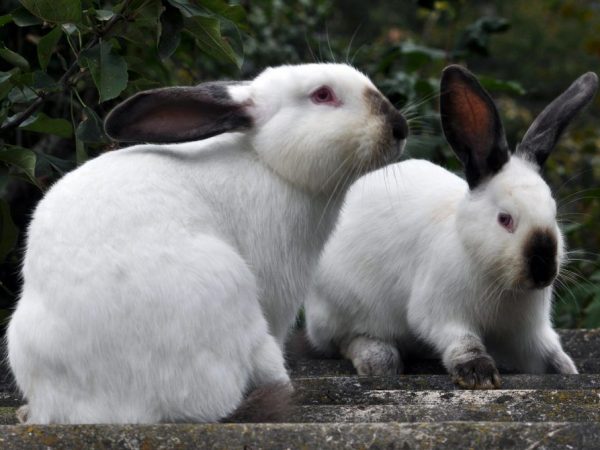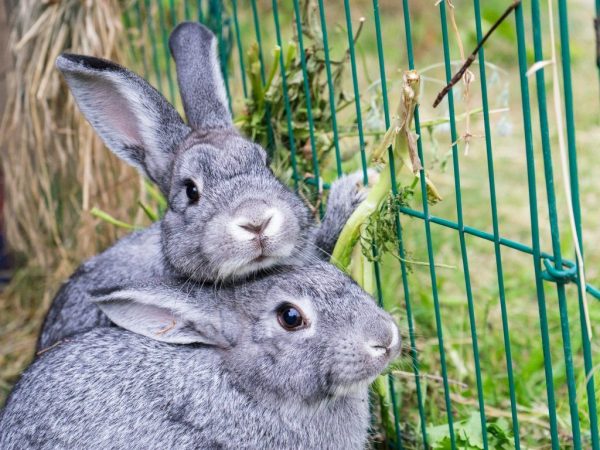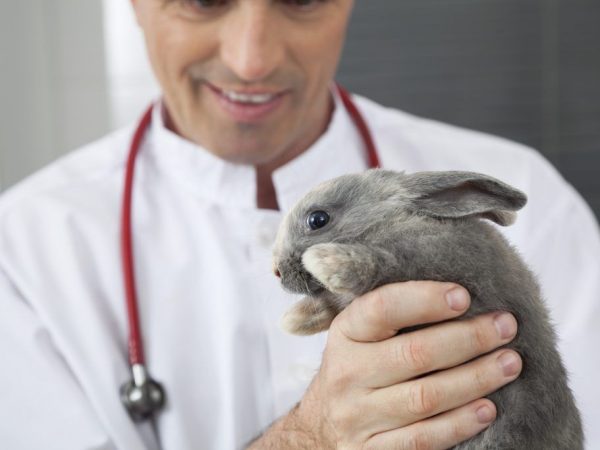Reasons for the rabbit's refusal to mate
Rabbits differ from other representatives of the fauna in that they are able to produce offspring throughout the year. The male is ready to cover the females almost daily, and the females are able to bear new offspring a short time after birth. However, it happens that mating does not go as smoothly as the breeder would like. This raises the question: why does the rabbit keep the rabbit out?

Why does the rabbit refuse to mate
There are many reasons for the refusal of a female to accept a male and mate. All of them are of a different nature, therefore, before taking measures to eliminate the problem, it is important to find out as accurately as possible what the cause of the female's behavior is.
What could be the reasons
The rabbit is able to mate much more often than other female domestic animals. Her body is able to endure new rabbits almost immediately after the next okrol has occurred. However, it happens that she does not allow the male to approach her. If this happens, it is worth analyzing her behavior.
At the moment, the following reasons are distinguished why the female refuses to mate or shows insufficient desire:
- Weather. The body of rabbits is quite sensitive to all changes in the environment. That is why the weather is a fairly common reason why the rabbit does not allow the rabbit. Temperatures that are too high or too low will make it difficult for the female to bear offspring. Feeling this at the level of instincts, she tries to prevent pregnancy by refusing to mate.
- Improper diet. Lack of vitamins and nutrients from food is another reason why the rabbit does not allow the male to come near her. The body of rabbits instinctively feels that a weakened state will lead to the fact that the offspring may be underdeveloped, she will not have enough milk for feeding, or a miscarriage may even occur. To prevent this from happening, the rabbit refuses to let the male go.
- The age of the female. Every breeder knows that the sexual function of an animal gradually fades with age. Old females, whose sexual functions have died out, refuse to mate. Having no desire to mate, they try to do everything possible to keep the male away from them.
- Insufficient daylight hours for pets. Violations in the light regime of keeping, as a result of which the duration of daylight hours is less than 7 hours, is likely to lead to the fact that the rabbit does not want to let the rabbit in and mate.
- Diseases of the rabbit's reproductive system. The reasons why it becomes impossible to mate rabbits are not always caused by external factors and the conditions of keeping the rabbits. Sometimes the rabbit does not allow males to come near her due to the fact that infectious, inflammatory or other processes in the genitals cause unpleasant and even painful sensations, which leads to a decrease in hunting and the corresponding behavior of the animal.

Reasons for refusing to mate
In order to monitor the rabbit's health, it is best to contact the veterinarian who will conduct a thorough examination.
Mating refusal factors
There are also other factors due to which the rabbit does not allow the male to mate, namely:
- Incorrect conditions for keeping animals. If the female does not allow the rabbit to approach her, this may indicate that the conditions in which the breeders are going to mate are not good enough. Lack of space or stuffiness can negatively affect, just like any other manifestations of discomfort.
- Weak or no hunting. It often happens that females have little or no desire for mating. This is evidenced by the behavior of the female, which is expressed in attempts to escape from the male attached to her. Attempts to fight with the male also indicate the presence of weak hunting or its absence.
These are the most common reasons why a rabbit may refuse to mate and keep the rabbit away from her. It is important for a breeder to clearly and fully analyze the set of conditions and circumstances in order to understand why his animal does not allow a partner to mate, and to take appropriate measures to solve this problem, which does not have the best effect on the level of breeding of rabbits.
It is important not to overlook several physiological factors that affect the hunting power of rabbits. Individuals of the female sex go on mating rather weakly during molting periods, in autumn, as well as in the heat.
Ways to solve the problem
Breeders often don't know what to do in a given situation. It is necessary to figure out in which direction it is worth moving.
First of all, it is advised to examine the animal for health problems. It is worth postponing mating in the event that strange discharge or swelling is noticed. Inflammation and infections not only reduce females' hunting, but can also have a devastating effect on the reproductive system of the animal. In this case, it is best to consult a veterinarian who will help restore the functions of the rabbit's body.

It is best to seek advice from a veterinarian
If the pet is completely healthy, it is worthwhile to analyze other possible causes and only then take measures to eliminate the current problem situation. Namely:
- A breeder should refrain from mating his animals in hot or too cold weather. If it is not possible to regulate the temperature in the room where the animals are kept, it is also not necessary to mate in the second half of July. As mentioned earlier, the female's instincts tell her that pregnancy can be problematic. For safety reasons, she does not admit the male. In order for the breeding of rabbits to bring the expected result, it is best to be able to listen to the opinion of the pets.
- The first mating in young rabbits can take place with the rejection of the male. In order not to delay this process, for the first mating, breeders are advised to choose a male with extensive sexual experience, who will not delay acquaintance and will show the pressure and perseverance inherent in the male sex.
- As mentioned earlier, an improper diet of animals becomes the cause, leading to a decrease in sex drive and desire to mate. In order to eliminate this problem, before the mating process, it is necessary to change the diet, adding more vitamins and nutrients to it. If the female is heavy, it is worth doing a little differently. In case of overweight, the breeder needs to feed such a female a little less, and also reduce the level of concentrate intake.
- Sometimes it is worth thinking about the exact room in which the mating of rabbits is going to take place. Insufficient space, tightness of the cage can negatively affect the mating process.In this case, transferring the couple to a more spacious aviary can help to correct the current situation.
For a successful mating, it is important that the rabbit is not a female rabbit. If there is little or no mating desire, the breeder may try to increase the attraction. For this, it is necessary to increase the frequency of meetings with the male. It is recommended to add the rabbit several times a day. More frequent dates tend to increase hunting.
To help the female to perceive the male differently, landing in his cage without the direct presence of the rabbit. Addiction to male scent can also have a positive effect on mating outcomes and eliminate breeding problems for breeding rabbits. Such procedures can be carried out several times a day before the start of the hunt.
Conclusion
When breeding rabbits, you should carefully study all the features of their species and behavioral lines. Having noticed deviations from the norm, it is worth carefully checking all the factors that could affect the animal in such a way.
First, it is worthwhile to carefully monitor the health of the female, and then check if the breeder himself made mistakes in the conditions of keeping his pets. By taking one or a few simple measures, you can eliminate problems with the sex drive of females and breed animals without obstacles and problems.


